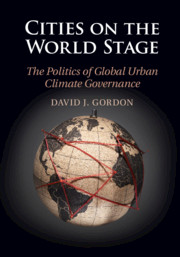Book contents
- Cities on the World Stage
- Cities on the World Stage
- Copyright page
- Contents
- Figures
- Tables
- Acknowledgments
- Abbreviations
- Introduction
- 1 The Contours of Coordination in the C40
- 2 A Theory of Global Urban Governance Fields
- 3 The Contours of Convergence in the C40
- 4 Act I
- 5 Act II
- 6 Act III
- Conclusion
- Book part
- References
- Index
5 - Act II
Convergence and Coordination
Published online by Cambridge University Press: 16 April 2020
- Cities on the World Stage
- Cities on the World Stage
- Copyright page
- Contents
- Figures
- Tables
- Acknowledgments
- Abbreviations
- Introduction
- 1 The Contours of Coordination in the C40
- 2 A Theory of Global Urban Governance Fields
- 3 The Contours of Convergence in the C40
- 4 Act I
- 5 Act II
- 6 Act III
- Conclusion
- Book part
- References
- Index
Summary
Whereas the C40 was fragmented in its early years, the network underwent a process of transformative change that began with the selection of Michael Bloomberg, as mayor of New York City, as C40 Chair in late 2009. As described in Chapters 1 and 3, both coordination and convergence around a common set of governance norms and a collective identity were increasingly apparent during the four-year period (2010-2014) in which New York occupied the C40 Chair. The theory of global urban governance fields is applied to explain why Bloomberg and New York were able to achieve what both the Clinton Climate Initiative and previous C40 Chairs could not. Bloomberg and New York brought with them considerable claims to material, reputational, and institutional capital, but it was the ability to link these to securing recognition for the cities of the C40 from external audiences – international financial institutions like the World Bank, multinational corporations, private capital markets – that authorized them to set the terms upon which such recognition would be granted within the governance field. In so doing the C40 began to converge toward a common set of governance norms – autonomy and global accountability – that underpin the production of coordinated action.
Keywords
- Type
- Chapter
- Information
- Cities on the World StageThe Politics of Global Urban Climate Governance, pp. 139 - 167Publisher: Cambridge University PressPrint publication year: 2020



